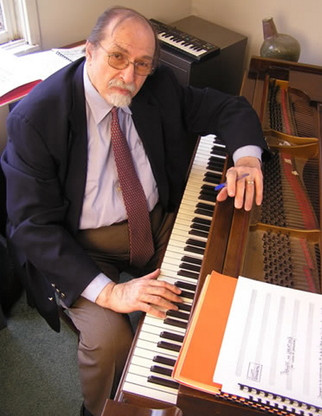Elliott Schwartz, one of Maine’s most influential classical music composers and a longtime Bowdoin College music professor known for inspiring students during a 43-year career, died Wednesday. He was 80.
Fellow composers and musicians from around the country flooded his Facebook page with their memories of his warm demeanor and creative mind, which constantly pushed the boundaries of music. He composed one piece based on actual Facebook posts, which included musicians reading the posts, while another piece featured TVs and radios on stage with the performers. His 1966 piece “Elevator Music” was performed by 12 small groups on various floors of a building, while the audience rode an elevator and heard parts of the piece on each floor.
“To classical music listeners outside the state, (Schwartz) was unquestionably Maine’s best-known composer, but it’s not until you look closely at Maine’s own musical life that you understand how influential he was,” said Allan Kozinn, a former New York Times music critic who now reviews classical music for the Portland Press Herald. “It’s hard to find a composer in Maine who hadn’t studied with him.”
Schwartz’s compositions have been performed by symphonies around the country, and books he wrote or co-wrote are used in many college music programs.
In 2006, his years of notes, sketches, files, sheet music, correspondence and recordings were acquired by the Library of Congress.
A RUSH TO SCHWARTZ’S BEDSIDE
Students, colleagues and friends went to Schwartz’s bedside in Brunswick this week, hoping to talk to him one last time as his health deteriorated. One former student, Mark Piszczek, flew up from Florida on Tuesday.
“When I saw him, I told him I’d bring (Maine composer Dan Sonenberg) to see him Wednesday, and he said that was good because he wasn’t sure he’d last four or five days,” said Piszczek, 59. “Then he said, ‘I have so much more to write.’ ”
Schwartz taught at Bowdoin from 1964 until 2007, but he continued to show up on campus, to eat in the dining hall, and to talk to students about music as much as they wanted. He continued to work with students, too.
Peter McLaughlin, 29, was one of his students during Schwartz’s last year at Bowdoin. Afterward, Schwartz continued to work with McLaughlin and meet with him. The two have had lunch together about every month for the past 10 years. Schwartz also wrote some music for a student group that McLaughlin was in and paid for the group to travel to New York to perform.
“Those of us in that last class were lucky because he was full of energy, and after retiring, he had all this free time that he spent with us,” said McLaughlin, a percussionist who works as music programmer at Space Gallery in Portland. “He loved his students. He loved young people. He was an infinitely energetic soul.”
CELEBRATIONS OF HIS CAREER
Schwartz was born in New York City and studied composition with well-known composers Otto Luening and Jack Beeson. His wife, Dorothy Schwartz, was an artist, professor and past director of the Maine Humanities Council who was considered a driving force in Maine’s cultural scene for some 20 years. She died in 2014 at the age of 75.
Besides his long career at Bowdoin, Schwartz had residencies or visiting professorships at Ohio State University, the University of California and Harvard, as well as Cambridge University in England.
Schwartz turned 80 in January, and throughout the year various groups and events honored him.
In Portland in April, the Back Cove Contemporary Music Festival celebrated his career with five of his works and some works by his students.
The Bowdoin International Music Festival held during the summer featured his music as part of a performance in July. Schwartz attended the performance.
“What impressed me about Elliott is that he was not only a lifelong creator and ardent advocate of new music, but that he also had a deep love of historical music of all eras and styles,” said David Ying, co-artistic director of the Bowdoin festival.
In a Bowdoin website article about his works being acquired by the Library of Congress, Schwartz was self-effacing: “I don’t think I’m being singled out because the Library thinks I’m a great composer. I think it’s partly because I’ve been a witness to so much that has happened in American music.”
But students and colleagues say Schwartz was innovative and extremely talented.
Schwartz, who played piano, was something of a musical collagist, said Vineet Shende, chair of the Department of Music at Bowdoin, a position Schwartz held for 12 years. Schwartz could find snippets of pieces that seemingly didn’t go together, but he would meld them perfectly.
He had a piece called “By George” that combined bits of music from Baroque composer George Handel with music by 20th century tune-smith George Gershwin. But it worked, Shende said.
Schwartz was also a fan of word puzzles, and he’d sometimes use notes in a composition – E, F, B – to spell out words only the musicians could see.
“He had a sense of humor and a playfulness. But his works were lyrical, presented beautifully,” Shende said.
Send questions/comments to the editors.




